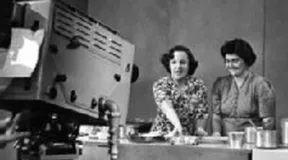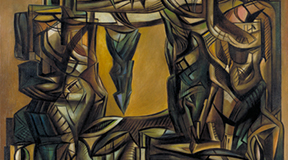Impact
The media plays a central role in our perceptions and understanding of ourselves as individuals and social beings and our society. It acts as both a mirror of our hopes and fears and drives the cultural changes that lead to the future we imagine for ourselves. Research in the Film & TV department offers a critical perspective on contemporary media, stimulates innovative thinking and the development of innovative products in the sector, and gives a new public profile to Britain's rich cultural history from the invention of the moving image onwards.
Our work has played an important role in preserving the cultural heritage of women's television programming in Britain and conserving the built heritage of Twentieth-century Europe. It has increased public awareness of the history of British television in the late Twentieth century and highlighted the importance of visual imagery to creating and sustaining, and challenging, politcal authority.
Re-writing women's TV history
 Rachel Moseley, Associate Professor
Rachel Moseley, Associate Professor Helen Wheatley, Associate Professor
Preserving Europe's built heritage for tomorrow
 Stephen Gundle
Stephen GundleProfessor of Film and TV Studies
Our Impact
Increasing engagement with our cultural heritage
By introducing a new perspective on our television history to today’s media professionals
Developing civil society
Re-defining our relationship between creative practice and the media and our social lives
Improving cultural policies
Changing how the national media archives preserves their holdings and informing policies to conserve Europe's built heritage
Reflecting and bringing a critical perspective to visual media
Showing how imagery has been used to create, sustain and even challenge political authority
Supporting community art projects
Encouraging the development of grassroots initiatives and working with local arts organisations
Our Partners
Culture Coventry
Women in Film and TV Network
British Film Institute
Flatpack Film Festival
KinoEgo
Warwick Arts Centre
Recent Media
Helen Wheatley talks to the Mail Online about the nation’s 'guilty pleasure' television, October 14th.Helen Wheatley comments on Disney’s claim that it is harder to animate female characters because of their emotional range, in the Independent on Sunday, October 13th.
Helen Wheatley talks to BBC Radio Coventry and Warwickshire about grassroots film project KinoEgo, September 4th.
Podcasts and Videos
Stephen Gundle's history of Glamour connects Greta Garbo, Madonna and Napoleon.I am so glad that this has been done. It reveals the better nature of Italy which persisted under and around Fascism which is very valuable.
Visitor from Sydney, Australia to the Against Mussolini Exhibition, Estorick Collection, London, 2011.
